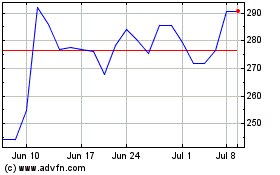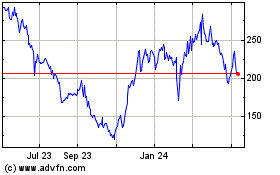Madrigal Pharmaceuticals, Inc. (NASDAQ:MDGL), a biopharmaceutical
company focused on delivering novel therapeutics for nonalcoholic
steatohepatitis (NASH)/metabolic dysfunction-associated
steatohepatitis (MASH), today announced the MAESTRO-NASH OUTCOMES
trial evaluating resmetirom for the treatment of patients with
compensated NASH cirrhosis has completed enrollment.
Bill Sibold, Chief Executive Officer of Madrigal, stated, “The
MAESTRO-NASH OUTCOMES trial is important for patients and the NASH
field more broadly because there is an urgent unmet need for
therapies that can prevent progression to the devastating
complications of decompensated cirrhosis and by extension reduce
the need for liver transplants due to NASH. NASH is already the
leading cause of liver transplantation among women in the U.S. and
second-leading cause among men. Today’s enrollment milestone brings
us one step closer to our goal of delivering the first effective
therapy to patients who currently have no approved treatment
options for compensated NASH cirrhosis. A positive outcome for this
study is also expected to support the full approval of Rezdiffra
for noncirrhotic NASH.”
Becky Taub, M.D., Chief Medical Officer and President of
Research & Development of Madrigal, added, “Our confidence in
the MAESTRO-NASH OUTCOMES study is grounded in the antifibrotic
profile of resmetirom as a liver-directed THR-β agonist and
supported by positive 52-week data from 180 patients with
compensated NASH cirrhosis studied in the Phase 3 MAESTRO-NAFLD-1
study. Madrigal is committed to long-term leadership in NASH
R&D, and we believe our fully enrolled outcomes studies will
play a central role in shaping the NASH treatment paradigm over the
next decade.”
MAESTRO-NASH OUTCOMES is a Phase 3, double-blind, randomized,
placebo-controlled study that noninvasively measures progression to
liver decompensation events in 845 patients with compensated NASH
cirrhosis, exceeding the initial enrollment target. The primary
endpoint of MAESTRO-NASH OUTCOMES is the incidence of composite
liver-related outcome events. Key inclusion criteria are
well-compensated NASH cirrhosis (Child-Pugh A) and presence of
three metabolic risk factors (metabolic syndrome). Patients are
randomized 3:1 in a blinded manner to receive 80 mg resmetirom or
matching placebo, given orally once daily. The study duration is
expected to be two to three years for accrual of the required
number of composite clinical outcome events.
About NASH Nonalcoholic steatohepatitis (NASH)
is a more advanced form of nonalcoholic fatty liver disease
(NAFLD). NASH is a leading cause of liver-related
mortality and an increasing burden on healthcare systems globally.
Additionally, patients with NASH, especially those with more
advanced metabolic risk factors (hypertension, concomitant type 2
diabetes), are at increased risk for adverse cardiovascular events
and increased morbidity and mortality.
Once patients progress to NASH with moderate to
advanced liver fibrosis (consistent with stages F2 to F3 fibrosis),
the risk of adverse liver outcomes increases dramatically. When a
patient with NASH progresses to cirrhosis, their risk of
liver-related mortality increases by more than 42
percent. NASH is rapidly becoming the leading cause of
liver transplantation in the U.S.
Madrigal estimates that approximately 1.5 million patients have
been diagnosed with NASH in the U.S., of which
approximately 525,000 have NASH with moderate to advanced
liver fibrosis. Madrigal is focusing on approximately 315,000
diagnosed patients with NASH with moderate to advanced
liver fibrosis under the care of the liver specialist physicians
during the launch of Rezdiffra.
NASH is also known as metabolic dysfunction associated
steatohepatitis (MASH). In 2023, global liver disease medical
societies and patient groups came together to rename the disease,
with the goal of establishing an affirmative, non-stigmatizing name
and diagnosis. Nonalcoholic fatty liver disease (NAFLD) was renamed
metabolic dysfunction-associated steatotic liver disease
(MASLD); NASH was renamed MASH; and an overarching term,
steatotic liver disease (SLD), was established to capture multiple
types of liver diseases associated with fat buildup in the liver.
In addition to liver disease, patients with MASH have at least one
related comorbid condition (e.g., obesity, hypertension,
dyslipidemia, or type 2 diabetes).
About the Resmetirom Phase 3 ProgramResmetirom
is a once-daily, oral, liver-directed THR-β agonist designed to
target key underlying causes of NASH. Madrigal is currently
conducting multiple Phase 3 clinical trials to evaluate
the safety and efficacy of resmetirom for the treatment
of NASH:
- The
pivotal MAESTRO-NASH (Moderate to Advanced
Fibrosis) study included a 52-week biopsy assessment
that supported accelerated approval and an ongoing 54-month
outcomes study designed to generate confirmatory data that, if
positive, will help verify the clinical benefit of Rezdiffra and
support full approval. The primary results of the MAESTRO-NASH
trial were published in the New England Journal of Medicine in
February 2024.
-
MAESTRO-NASH OUTCOMES (Compensated
Cirrhosis) evaluates progression to liver
decompensation events in patients with
compensated NASH cirrhosis treated with resmetirom versus
placebo. A positive outcome is expected to support the full
approval of Rezdiffra for noncirrhotic NASH and expand
the eligible patient population for Rezdiffra with an additional
indication in patients with
compensated NASH cirrhosis.
-
The MAESTRO-NAFLD-1 (Safety) study was
designed to noninvasively evaluate the safety and tolerability of
resmetirom and provide a larger safety database to support
regulatory benefit-risk assessment. The primary results from the
MAESTRO-NAFLD-1 trial were published in Nature Medicine in
October 2023. MAESTRO-NAFLD-OLE, an open-label active treatment
extension of MAESTRO-NAFLD-1, is ongoing to collect additional
safety data in patients with noncirrhotic NASH and
patients with compensated NASH cirrhosis.
Data from the 52-week portion of MAESTRO-NASH, together with
data from MAESTRO-NAFLD-1, MAESTRO-NAFLD-OLE, Phase 2 and Phase 1
data, including safety parameters, formed the basis for accelerated
approval of Rezdiffra for treatment of NASH with moderate
to advanced liver fibrosis.
About Madrigal PharmaceuticalsMadrigal
Pharmaceuticals, Inc. (Nasdaq: MDGL) is a biopharmaceutical
company pursuing novel therapeutics for nonalcoholic
steatohepatitis (NASH), a liver disease with high unmet medical
need. Madrigal’s medication, Rezdiffra (resmetirom), is a
once-daily, oral, liver-directed THR-β agonist designed to target
key underlying causes of NASH. For more information,
visit www.madrigalpharma.com.
Forward-Looking StatementsThis press release
includes “forward-looking statements” made pursuant to the safe
harbor provisions of the Private Securities Litigation Reform Act
of 1995, that are based on Madrigal’s beliefs and assumptions and
on information currently available to it but are subject to factors
beyond its control. Forward-looking statements reflect management’s
current knowledge, assumptions, judgment and expectations regarding
future performance or events. Forward-looking statements include
all statements that are not historical facts; statements referenced
by forward-looking statement identifiers; and statements regarding:
Rezdiffra and its expected use for treating NASH with
moderate to advanced fibrosis.
Forward-looking statements can be identified by terms such as
“accelerate,” “achieve,” “allow,” “anticipates,” “appear,” “be,”
“believes,” “can,” “confidence,” “continue,” “could,”
“demonstrates,” ”design,” “estimates,” “expectation,” “expects,”
“forecasts,” “future,” “goal,” “help,” “hopeful,” “inform,”
“informed,” “intended,” “intends,” “may,” “might,” “on track,”
“planned,” “planning,” “plans,” “positions,” “potential,” “powers,”
“predicts,” ”predictive,” “projects,” “seeks,” “should,” “will,”
“will achieve,” “will be,” “would” or similar expressions and the
negatives of those terms.
Forward-looking statements are subject to a number of risks and
uncertainties including, but not limited to: the assumptions
underlying the forward-looking statements; risks of obtaining and
maintaining regulatory approvals, including, but not limited to,
potential regulatory delays or rejections; the challenges with the
commercial launch of a new product, particularly for a company that
does not have commercial experience; risks associated with meeting
the objectives of Madrigal’s clinical studies, including, but not
limited to Madrigal’s ability to achieve enrollment objectives
concerning patient numbers (including an adequate safety database),
outcomes objectives and/or timing objectives for Madrigal’s
studies; any delays or failures in enrollment, and the occurrence
of adverse safety events; risks related to the mechanism of action
of Rezdiffra; enrollment and trial conclusion uncertainties; market
demand for and acceptance of our product; the potential inability
to raise sufficient capital to fund ongoing operations as currently
planned or to obtain financings on terms similar to those arranged
in the past; the ability to service indebtedness and otherwise
comply with debt covenants; outcomes or trends from competitive
studies; future topline data timing or results; our ability to
prevent and/or mitigate cyber-attacks; the timing and outcomes of
clinical studies of Rezdiffra; the uncertainties inherent in
clinical testing; and uncertainties concerning analyses or
assessments outside of a controlled clinical trial. Undue reliance
should not be placed on forward-looking statements, which speak
only as of the date they are made. Madrigal undertakes no
obligation to update any forward-looking statements to reflect new
information, events, or circumstances after the date they are made,
or to reflect the occurrence of unanticipated events. Please refer
to Madrigal’s submissions filed with the U.S. Securities and
Exchange Commission, or SEC, for more detailed information
regarding these risks and uncertainties and other factors that may
cause actual results to differ materially from those expressed or
implied. Madrigal specifically discusses these risks and
uncertainties in greater detail in the sections appearing in Part
I, Item 1A of its Annual Report on Form 10-K for the year
ended December 31, 2023, filed with
the SEC on February 28, 2024, and Part II, Item 1A
of its Quarterly Report on Form 10-Q for the quarter ended June 30,
2024, filed with the SEC on August 7, 2024, and as updated from
time to time by Madrigal’s other filings with the SEC.
Investor Contact Tina Ventura,
IR@madrigalpharma.com
Media ContactChristopher Frates,
media@madrigalpharma.com
Madrigal Pharmaceuticals (NASDAQ:MDGL)
Historical Stock Chart
From Nov 2024 to Dec 2024

Madrigal Pharmaceuticals (NASDAQ:MDGL)
Historical Stock Chart
From Dec 2023 to Dec 2024
